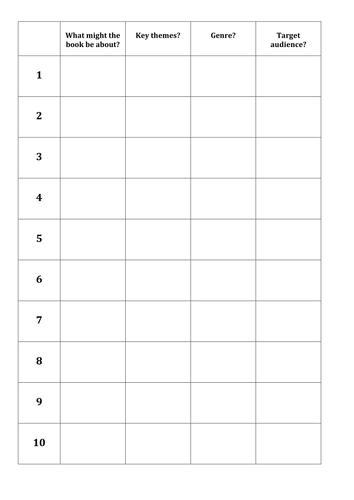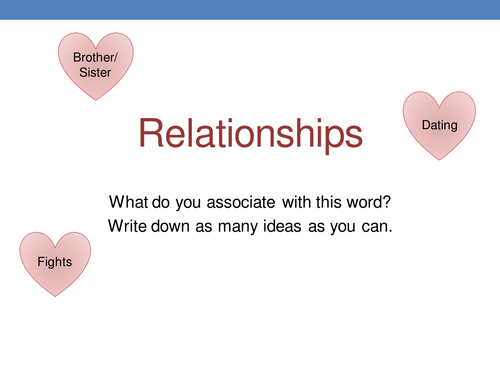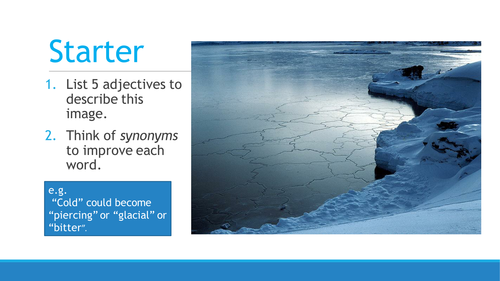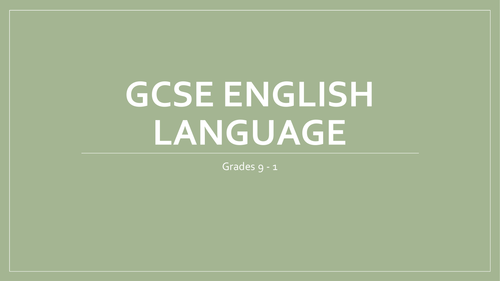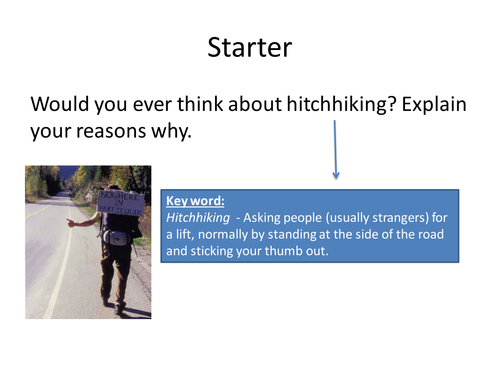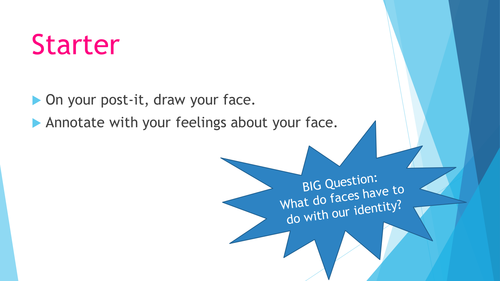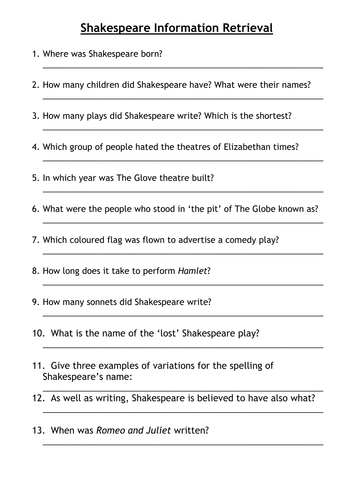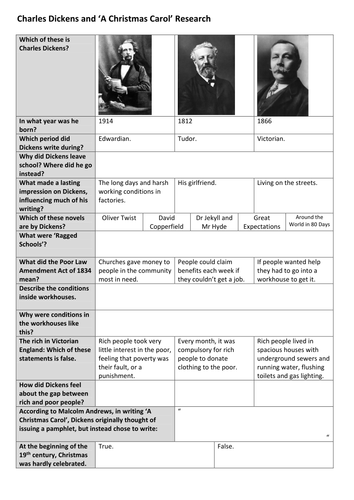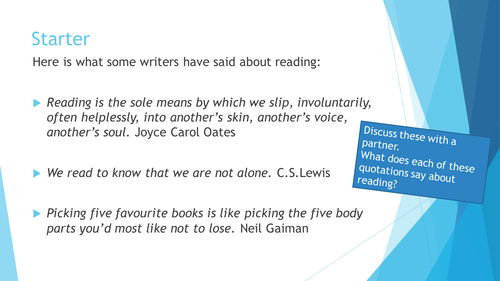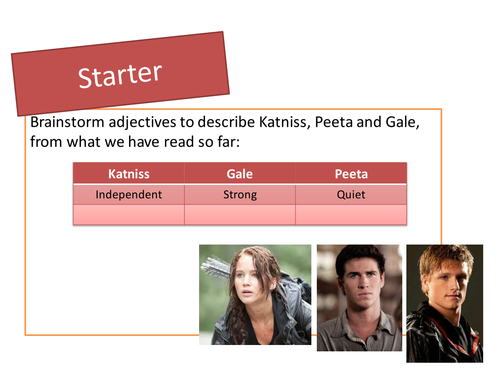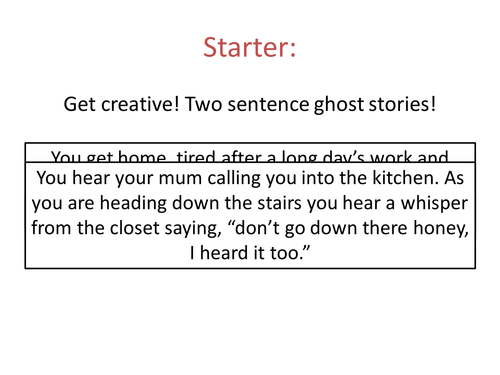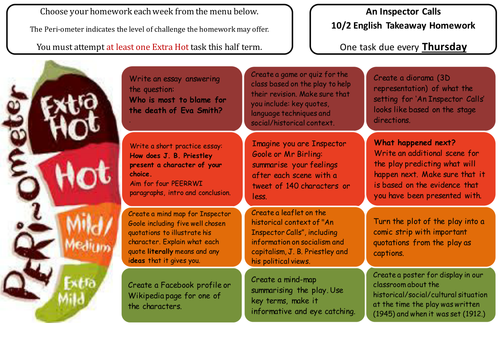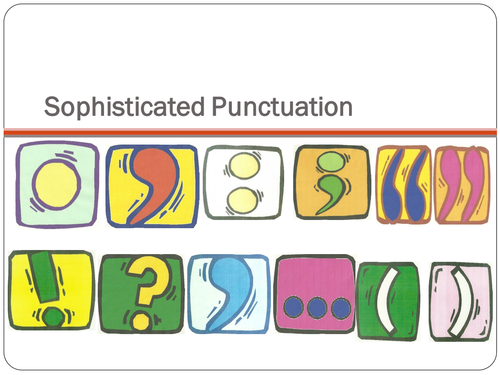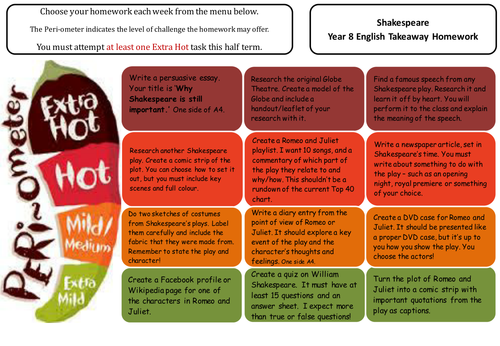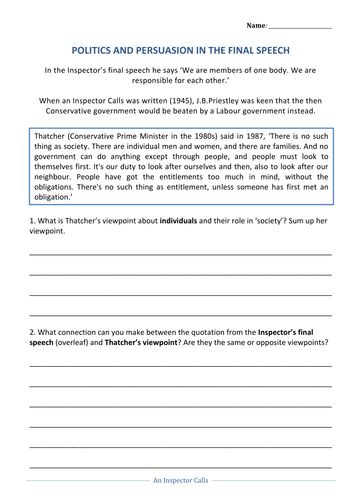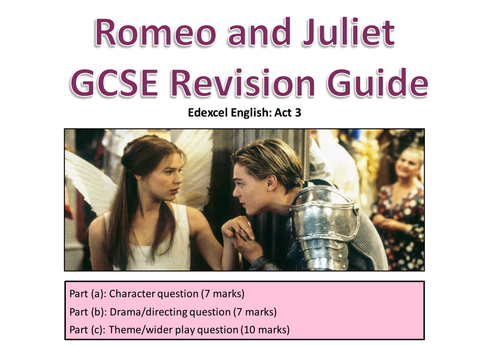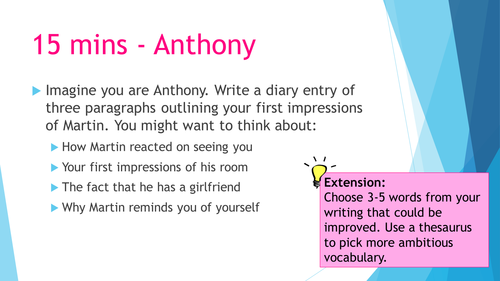68Uploads
258k+Views
606k+Downloads
English language arts

Inference and Reading for Meaning
A series of lessons focussing on developing inference skills. Allows students to think creatively to infer meaning from pictures and film stills. Links into topics on presentational devices thinking about the genre and audience of different books based on the covers.
(Adapted into lesson powerpoints from ideas by johncallaghan)

'Quickdraw' by Carol Ann Duffy - Lesson
An effective lesson on AQA Moon on the Tides, Relationship cluster poem 'Quickdraw&'. Year 10, A*-C. I taught this lesson for a job interview, in which I was successful. It allows students to demonstrate very quick progress whilst looking closely at Duffy&';s meaning and language choices. Ends with students writing a paragraph response.

KS3 Creative Writing SOW
A two week SOW for KS3 (used with middle ability Year 8 classes). Tasks mainly focussed on developing descriptive writing skills.
Includes challenge tasks throughout.
Includes story creator where students lucky dip a story title, setting etc to stimulate writing. Ended unit with the challenges lesson, allowing students to play with creative writing techniques and styles, choosing which activities to complete during the lesson.

Imaginative Creative Writing Unit 9-1
A short 5 lesson unit on Imaginative/Creative writing, created for the new GCSE English Language 9-1 spec. Contains lessons on describing setting and character, effective story openings, narrative structure (using The Simpsons) and the importance of planning.
Clear assessment and success criteria checklists, which could be used for self/peer assessment.
Some differentiation/challenge activities, but may need more to adapt to your group.

Hitcher - Simon Armitage (2 lessons, PEE)
Two lessons looking at the poem 'Hitcher&'. Exploring the poem, justifying opinions and building to PEE paragraphs.

Face - Benjamin Zephaniah SoW Part 1
Part 1 of 2. Series of lessons to follow with class reading of Face by Benjamin Zephaniah.
Lessons may last more than one lesson, but follow in order of the chapters in the book. Includes opportunity for writing assessment (newspaper article or persuasive speech writing). Extension/challenge tasks included.
Taught to high and middle ability Year 8 students.

Shakespeare Information Retrieval Hunt
Four posters with information and facts about Shakespeare, his work, Elizabethan theatre and Romeo & Juliet. Worksheet with 22 questions to find answers for.
I pin up the posters around the room and students go around with their worksheets to find the answers - a lot of fun and a lot of learning!
Introductory context lesson for KS3 SoW.

Charles Dickens 'A Christmas Carol' research lesson
A worksheet to structure student research on Charles Dickens and 'A Christmas Carol'. I have slightly adapted the worksheet for different year groups: Year 7, Year 8 and Year 10 (just titled Charles Dickens research). A range of multiple choice and written answer sections. Great for lower ability but also a success with high ability pupils!

Adventure story structure
Outlining the structure of adventure stories. Students then match this structure to plots of books/films they already know. Literacy.

The Hunger Games SoW
Series of lessons on The Hunger Games, taught to high ability Year 9 students. Includes some edited parts of resources found on TES. Covers key themes as well as reading and writing skills.
Please leave a comment if you download, use and like!

The Red Room, H. G. Wells unit (Year 9)
A short three/four lesson unit on The Red Room by H.G.Wells, exploring the ghost story/mystery genre, how an author builds suspense and tension, building towards an essay question response or creative writing task.
Used with top set Year 9, and a middle ability set.
Split the story into 3 sections. Three PowerPoints. Quote analysis activities on worksheets for group work.

An Inspector Calls Takeaway Homework
A takeaway homework menu, created for high ability Year 10 students. 3 options for each level of challenge, covering tasks from tweets, summaries, context research, character essays etc...

Outstanding Sophisticated Punctuation Lesson
A recently observed lesson which was graded 'Outstanding'. Taught to high ability Year 9 group. Would also work as exam skills refresher for KS4 pupils.
Powerpoint goes through a range of sophisticated punctuation devices, explaining how and when they should be used.
There is also an opportunity for students to have a go at using each device, with unpunctuated sentences for students to complete (students can come up to the board to show where they would put the punctuation too).

KS3 Shakespeare Takeaway Homework
A takeaway homework menu for KS3 students studying Romeo and Juliet. I have used with high and middle ability Year 8 students. You could set one task to be completed weekly, or ask that 2/3/4 be handed in by a certain due date. I have had some amazing 3D Globe Theatre models created by students! Hope you find it helpful!

The World's Wife - Duffy (IB Language and Literature 2021)
A series of lessons on Carol Ann Duffy’s ‘The World’s Wife’, planned for the IBDP Language and Literature course (for first examination in 2021). This unit was taught as preparation for the students in the IO Oral Examination, therefore this is a focus on Global Issues explored within the poems. The unit title is: ‘Representations of Identity and Gender’.
Please note - Powerpoints were originally created on Google Slides and therefore there may be some slight formatting features that need fixing in Powerpoint.
Includes:
Lesson Powerpoints for the following 10 poems:
Little Red Cap
Thetis
Mrs Sisyphus
Mrs Aesop
Mrs Midas
Medusa (with a worksheet for groups/students to explore some secondary reading about interpretations of the myth of Medusa)
Delilah (with an article about masculinity to connect)
Anne Hathaway
Pilate’s Wife (with a question task sheet)
The Devil’s Wife
In addition, a worksheet for students to research the context for the poems before studying them is included.
Lesson Powerpoints include a clear lesson question (e.g. How does Duffy explore the consequences of greed and avarice in ‘Mrs Midas’?. There is usually guiding questions for student annotations, and often ideas for global issue connections or optional Learner Portfolio task ideas.

An Inspector Call's final speech
A worksheet guiding students to think about the Inspector's final speech.
Making links to the political context and including except from a Thatcher speech.
Includes annotating of two short passages and some written responses.

Romeo and Juliet revision pack Edexcel English F
A revision booklet pack for Edexcel English - The Writer's Craft Foundation Paper.
This is based on extracts taken from Act 3 of the play (the chosen focus act for June 2016 exams). Includes brief summary of how to answer parts a, b and c with sentence starters to support low-ability students, then a selection of extracts from Act 3, with example exam questions. Could be used in revision or intervention sessions, or set for homework.

Face - Benjamin Zephaniah SoW Part 2
Part 2 of 2. Series of lessons to follow class reading of Face by Benjamin Zephaniah. Lesson powerpoints probably run over two or more lessons, but follow the chapters of the book with various activities, questions etc.
Taught to high and middle ability Year 8s.
Opportunities for writing assessment in Part 1 of SoW (newspaper article or persuasive speech writing). Extension/challenge options included.
Body Image lesson relies on students bringing in magazines to analyse - we created posters in pairs/3s labelling how body image was represented in the media, then spent a lesson linking this learning to the novel.

Science Fiction genre lesson - I. Robot
A lesson exploring the genre of science fiction through clips from the film I, Robot. Includes a number of activities and discussion points.
Used with a mixed ability Year 8 class.

The Hate U Give Unit
This is a series of lessons based on the novel ‘The Hate U Give’ by Angie Thomas. This scheme was created with mixed ability Year 9s in mind, and would be suited to Year 9 students and above.
Originally created on Google Slides so there may be some slight formatting fixes needed in Powerpoint
The presentation features lessons to run alongside the reading of the novel as a class, with questions, key skills for literature analysis and starters that develop students’ spelling, punctuation and grammar. As this unit is literature focused, the main tasks include: quotation hunts as well as analysis of characters, themes and quotations. There is an mini-assessment opportunity (exploring how setting is created by Thomas) and final assessment question options. There are also some writing activities included.
The start of the book (Chapters 1-12) is covered extensively as the study of this section sets up the enjoyable reading of the later chapters of the novel. Later chapters are not covered individually, but there are resources specifically for Chapter 22 and 23, as well as a silent debate task and potential final assessment questions. This would make a great starting point for building or developing your own scheme on the novel if you wished for greater depth of the later chapters.
There are opportunities for independent, paired and group work embedded in the lesson presentations, as well as research.
Challenge and extension tasks, as well as sentence starters to support weaker students, are included with all activities.
The overview document (SOL) is not been included but can be easily created from the LOs.

